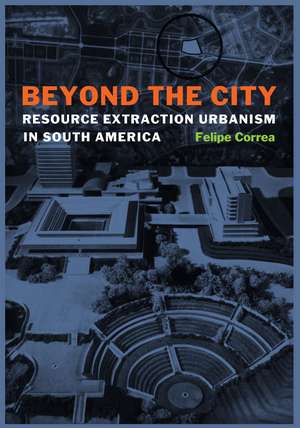Beyond the City: Resource Extraction Urbanism in South America
Autor Felipe Correaen Limba Engleză Hardback – 7 iun 2016
Implementing the term “resource extraction urbanism,” the architect and urbanist Felipe Correa takes us from Brazil’s nineteenth-century regional capital city of Belo Horizonte to the experimental, circular, “temporary” city of Vila Piloto in Três Lagoas. In Chile, he surveys the mining town of María Elena. In Venezuela, he explores petrochemical encampments at Judibana and El Tablazo, as well as new industrial frontiers at Ciudad Guayana. The result is both a cautionary tale, bringing to light a history of societies that were “inscribed” and administered, and a perceptive examination of the agency of architecture and urban planning in shaping South American lives.
Preț: 350.14 lei
Nou
Puncte Express: 525
Preț estimativ în valută:
66.100€ • 70.14$ • 55.44£
66.100€ • 70.14$ • 55.44£
Carte indisponibilă temporar
Doresc să fiu notificat când acest titlu va fi disponibil:
Se trimite...
Preluare comenzi: 021 569.72.76
Specificații
ISBN-13: 9781477309414
ISBN-10: 1477309411
Pagini: 178
Dimensiuni: 178 x 254 x 20 mm
Greutate: 0.57 kg
Editura: University of Texas Press
Colecția University of Texas Press
ISBN-10: 1477309411
Pagini: 178
Dimensiuni: 178 x 254 x 20 mm
Greutate: 0.57 kg
Editura: University of Texas Press
Colecția University of Texas Press
Notă biografică
Felipe Correa is an associate professor of urban design and Director of the Urban Design Program at the Harvard University Graduate School of Design. His previous books are Mexico City: Between Geometry and Geography and A Line in the Andes, which won first prize in the Architecture, Landscape, and Urbanism Category at the 2014 Pan American Architecture Biennale.
Cuprins
- Acknowledgments
- Introduction. Shaping Resource Extraction
- Chapter 1. A Regional Capital: Belo Horizonte
- Chapter 2. A Mining Town Constellation: María Elena
- Chapter 3. Petrol Encampments: Judibana and El Tablazo
- Chapter 4. A New Industrial Frontier: Ciudad Guayana
- Chapter 5. Pioneering Modernity: Vila Piloto
- Epilogue. The Legacy of Resource Extraction Urbanism and the Future of the South American Hinterland
- Notes
- Index
Recenzii
[Correa's] work describes a series of ex novo urban and regional projects in South America sited and designed to facilitate the mining or harvesting of natural resources. This arresting group of incarnated dreams offers a vivid alternative—or critically supplementary—history of the modern city, embodying an aspirational possibility in which both creating an urban design and realizing it can be imaginative and literal all at once. . . . The author’s evocation of the urban and the territorial is acute and revelatory, a nuanced analysis of the interaction of formal ideals and the aggressive extraction of the earth’s resources.
Descriere
Presenting five case studies from South America, this foundational book examines the roles played by architecture and urban design in large territorial transformation projects, which remake landscapes but leave a questionable legacy when resource-extracti
